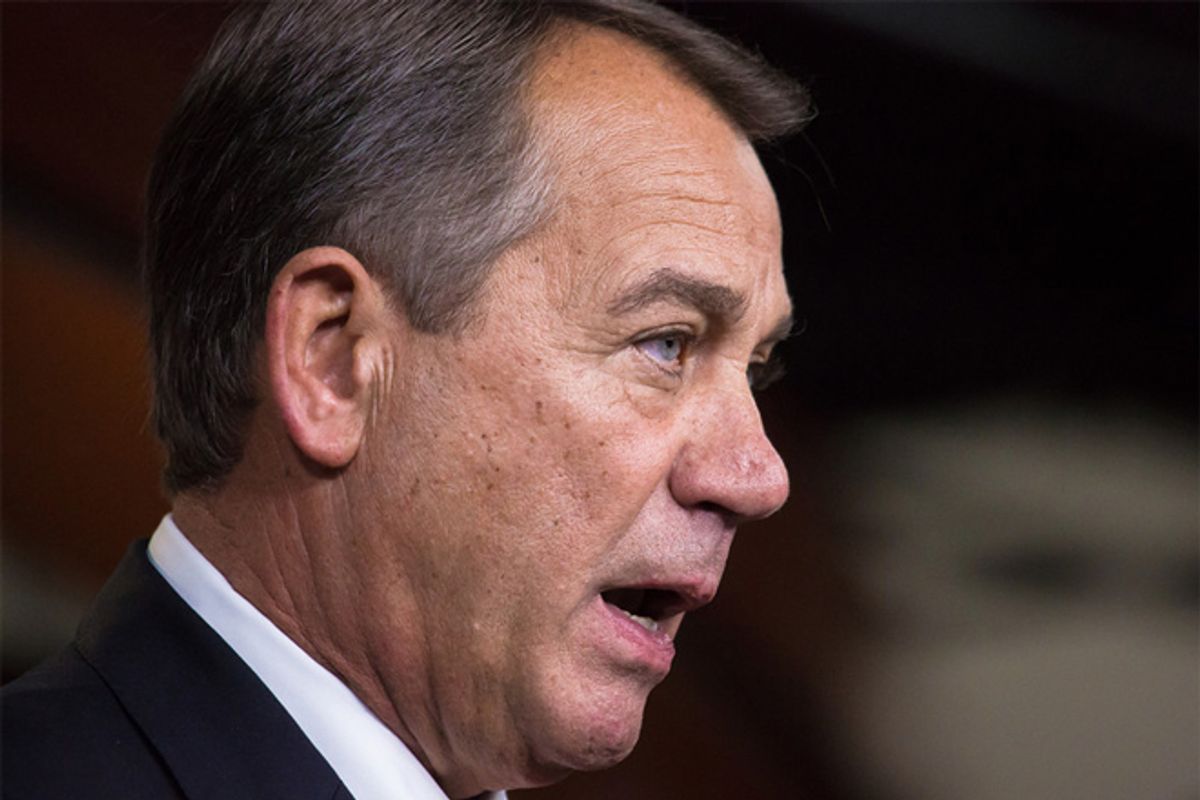John Boehner may not last much longer as speaker of the House – but I wouldn’t count him out. Despite having an impossible situation, he’s probably done about as well as anyone could, this week’s Plan B meltdown notwithstanding. He may, as Steve Kornacki suggests, simply decide he’s had it and walk away. But House Republicans, whether moderate or conservative, would be foolish to encourage it.
For most of the 20th century, speaker of the House wasn’t a particularly important job – powerful committee chairs ruled, and speakers could do little about it. A long process of reform, however, removed most of the clout of those barons and strengthened party leadership, making modern speakers far more powerful than their mid-century predecessors. Since the modern speakership emerged in the 1970s, there have been three basic models of how to handle the office:
Dictators: Newt Gingrich and Jim Wright. Both used the rules to maximize the influence of the speaker, running a top-down House which brought whatever the speaker wanted to the floor with ruthless efficiency. Committees were mostly irrelevant, and they were packed to guarantee the speaker’s influence anyway. In both cases, members were at first perfectly happy with the arrangement; both speakerships began with plenty of pent-up majority party ideas, and so having those ideas turned into laws (or at least having them pass the House) was enough to keep everyone happy – for a while. Soon enough, however, members tired of the situation, and neither Gingrich nor Wright lasted long in their jobs.
Weaklings: Dennis Hastert and Tom Foley. Both followed dictators, and both reacted by decentralizing, giving committees more responsibility. Generally, it didn’t work out very well. It’s probably a coincidence that both speakerships ended when their parties lost majorities in the House, but it may not be a coincidence that both had majorities with an unusual number of ethics scandals. Both found it difficult to pass legislation – remember that Bill Clinton’s health bill never made it to the House floor.
Masters of the House: Nancy Pelosi and Tip O’Neill. Both did an excellent job of balancing the preferences of the party as a whole with preferences of individual members – remembering, of course, that it’s the same individuals who have mixed preferences for party success and individual influence over issues which they care about the most. Both had their difficulties when the context worked against them – Pelosi in her first term when Democrats were frustrated by an inability to stop the war in Iraq, and O’Neill in 1981 when the last gasp of the conservative coalition passed major legislation. But the success of their speakerships can be seen from the way that both easily survived those down times and thrived.
From all the available evidence, John Boehner has tried to follow the examples of Pelosi and O’Neill, and not either of his Republican predecessors. Committee chairs, including Budget Committee Chair Paul Ryan and Ways and Means Chair Dave Camp, have had prominent roles and appear to act at least somewhat independently of the party leadership. On the other hand, Boehner has been front-and-center in several high-profile negotiations with the White House, and generally one hears few complaints from Republicans that the House is poorly run, at least not the kind of complaints that lead to a coup. All that is to Boehner’s credit.
The most serious complaints, which might even lead to a challenge to his position when the new House is sworn in after the new year, are from the right-most fringe of the party. This would be a challenge to any speaker. Basically, the fringe members appear to be taking it out on Boehner that they can’t have everything they want, despite not only being a minority of the House Republicans conference, but also with Democrats holding the White House and a majority in the Senate – all situations far beyond the control of any Republican speaker. Those members have also been responsible for a series of embarrassments to Boehner and House Republicans, with the “Plan B” fiasco this week only the latest. Again, however, it’s hard to see what anyone could do against the reality-rejecting radicals.
Nor is there much Boehner can do about the threat of primary challenges to any member who deviates even slightly from the latest conservative line. Granted, it’s a threat which helps him quite a bit at times, as long as his position is the one conservatives are supposed to take. But overall, it makes his job a lot harder.
Now, Boehner hasn’t been perfect by any means. In particular, the purge of three conservative members from their committee assignments last month was likely to backfire, and nor, as he presumably intended, serve as a strong deterrent to other radical conservatives to stay in line. The problem is that the punishment wasn’t severe enough, and those members were probably happy to give up their better committee perches in exchange for getting a reputation as martyrs to the conservative movement.
But overall, Boehner’s problems over the last two years have not been of his own making. It’s a tough job to begin with, and it's quite a bit harder when The Crazy has such a strong hold on a large chunk of the party. For all of the Republicans’ problems, at least an inept speaker isn’t one of them.
Now, if they can only fix everything that is wrong with the party.



Shares